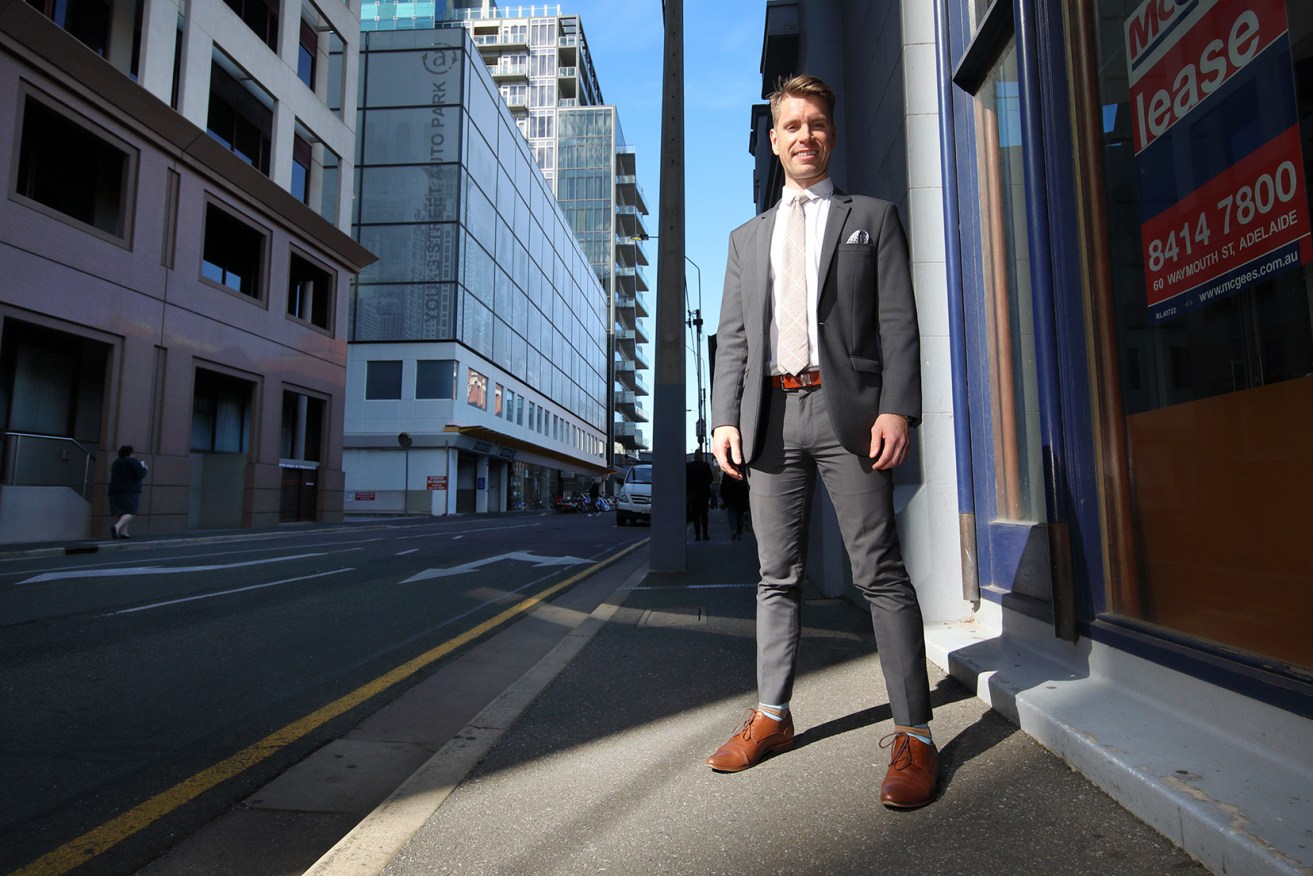The greening of Adelaide: Candidate wants to re-pave the CBD
A former Greens staffer turned Adelaide City Council election candidate wants to re-pave the entire CBD and replace some of its residential roads with lawn.


Central Ward candidate and former Greens staffer Sam Taylor says all or most of the city's footpaths should be replaced with higher-quality pavers. Photo: Tony Lewis / InDaily
Sam Taylor – former media advisor to SA Greens leader Mark Parnell – says voters are crying out for politicians with long-term vision and a more intellectually nuanced approach to public office.
Taylor, who has put his hand up to represent central ward at the November council elections, told InDaily he wants the council to re-pave all of the footpaths across the CBD, prioritise pedestrians in the transport hierarchy and embark on a wholesale upgrade of public spaces to match the quality of the recently upgraded laneways connecting the Central Market to the Riverbank.
He said the gargantuan redevelopment could be funded through a “city deal” – a funding partnership involving all three levels of government, as well as investment from business – or over 10 city council budgets.
“We’ve not just talking pavement,” said Taylor.
“We’re … talking from-scratch redesign.”
Taylor argued that most of the footpaths across the CBD are not at an acceptable standard now, and that a wholesale footpath replacement program would improve Adelaide’s international reputation.
“I’d argue that most of the footpaths in Adelaide aren’t even at a base level (of quality),” he said.
“Obviously it’s not an overnight thing – it would be (implemented) over many, many budgets.”
He acknowledged that “not all footpaths are created equal” and that recently upgraded footpaths would be replaced later in the project’s long-term timeline.
But former CEO of the Department of Planning, Transport and Infrastructure Rod Hook told InDaily simply replacing all or most of the city’s footpaths would come at huge expense.
He said it costs between $30 and $90 per square metre to replace footpaths, and that preparing the base underneath the pavers and changing curbing to widen footpaths would add further cost.
“If you’ve got a perfectly good footpath it costs minimal money to keep it there,” he said.
“I could just envisage that working through city streets (and replacing footpath) and changing something that’s perfectly adequate to something that’s more costly to do, obviously that’s really going to (add) up.”
Taylor, who works as a marketing and strategy consultant for not-for-profits, is also suggesting the council could replace the road along some residential streets in the CBD with lawn.
He argued that establishing park-like space on quiet city streets – as a pilot scheme – would improve the health and wellbeing of their residents.
He suggested some streets could be replaced with grass and closed to cars altogether – with, perhaps, car parking facilities established at both ends of the street.
Other residential streets in the CBD could also be more pedestrianised, though less radically – by replacing bitumen with high-quality paving, by limiting through-traffic to a small number of hours each day or by making two-way streets into one-way streets.
“My hope is that each (street) could be taken on a case-by-case basis,” he said, adding that cars were likely to be increasingly redundant for city residents in the coming decades.
He said many city residents already mostly walked or cycled for most of their transport needs, and that some, especially those living in quiet, narrow streets in the city’s south, would be open to ditching the car altogether.
“If you take away the assumption of cars, it unleashes people’s creativity,” he said.
“I’m really hoping that there’s an opportunity to think really outside the box.”
But Hook said it was reasonable to assume that people will, for the foreseeable future, require access to their properties by car.
“People will continue to use cars,” he said.
“That’s why every property needs to have access to a public road.”




